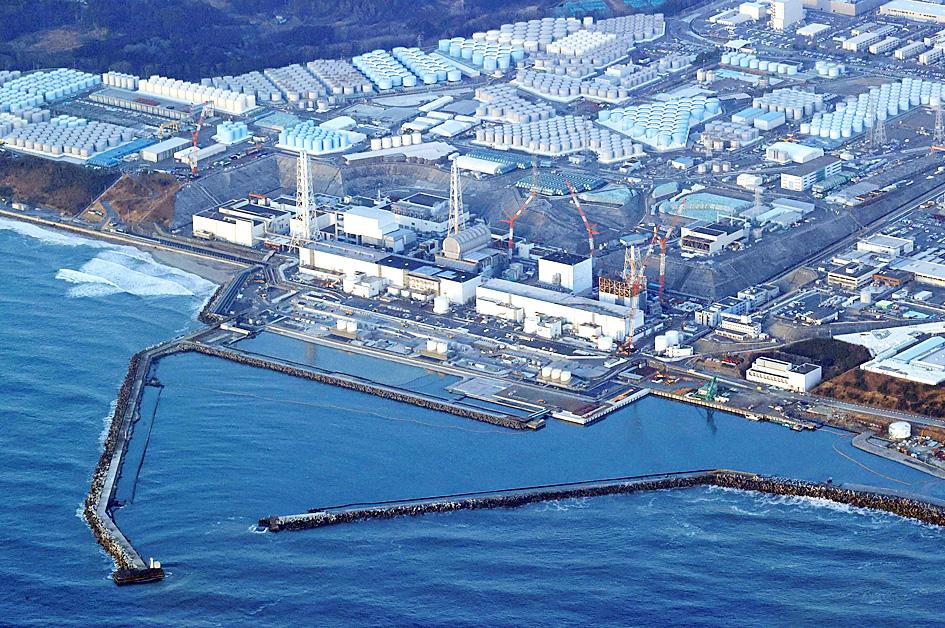Starting yesterday, food from Fukushima became freely available in the UK — weeks after British Prime Minister Boris Johnson snacked on popcorn from the Japanese prefecture devastated by a nuclear power plant disaster in March 2011.
Britain restricted Fukushima imports after the disaster, the world’s worst nuclear accident since Chernobyl, but has gradually lifted them, even as other countries limit or ban produce from the region.
Johnson confirmed that the remaining restrictions were to end yesterday when he met on Tuesday with Japanese Prime Minister Fumio Kishida on the fringes of the G7 summit in Germany.

Photo: Reuters /Kyodo
Johnson told Kishida that UK-Japan relations were going from “strength to strength.”
“Two great island democracies, united in our values, determined to stand up together against autocracies and the dangers of drifting backwards in the world, but also wanting to do more together on technology, on security, on trade, and of course I’m delighted that tomorrow — finally — we are able to have Fukushima-origin products all over the shops in the UK,” he said.
The supermarket chains Tesco and Waitrose have said they have no immediate plans to sell Fukushima produce. Instead, many of the items would be available at Japanese restaurants and specialist Japanese stores in England, Scotland and Wales.
The restrictions will remain in place in Northern Ireland, which is subject to EU rules on food and drink from Fukushima and other prefectures affected by the incident 11 years ago.
The scrapping of the restrictions was made possible after the UK Food Standards Agency dropped a limit of 100 becquerels — a measure of radioactivity — per kilogram contained in Japanese food.
“Our risk assessment shows that removing the 100 becquerels per kilogram (Bq/kg) maximum level of radiocaesium for food imported from Japan to the UK would result in a negligible increase in dose and any associated risk to UK consumers,” the agency said in a report late last year.
The Fukushima prefectural government says that, post-disaster, its food safety standards are among the most stringent in the world.
The government-set upper limit for radioactive caesium in ordinary foodstuffs, such as meat and vegetables, is 100Bq/kg, compared with 1,250Bq/kg in the EU and 1,200Bq/kg in the US.
The lifting of restrictions would affect 23 food products, such as mushrooms, which previously needed to carry proof that they had been tested for radioactive material, Nikkei Asia reported.
The Japanese government said it “welcomes the fact that the UK government reached this decision based on scientific evidence, as it will support the reconstruction of the affected areas.”
It added that it would “continue to work towards the early lifting of the remaining import restrictions in the EU and other countries and regions.”
China, Russia, South Korea, Indonesia, Taiwan and several other countries still impose import restrictions.
Johnson first sampled Fukushima produce in 2017 when, as foreign secretary, he swigged a can of peach juice given to him by his Japanese counterpart, Taro Kono, declaring it “Yum.”

STEPPING UP: Diminished US polar science presence mean opportunities for the UK and other countries, although China or Russia might also fill that gap, a researcher said The UK’s flagship polar research vessel is to head to Antarctica next week to help advance dozens of climate change-linked science projects, as Western nations spearhead studies there while the US withdraws. The RRS Sir David Attenborough, a state-of-the-art ship named after the renowned British naturalist, would aid research on everything from “hunting underwater tsunamis” to tracking glacier melt and whale populations. Operated by the British Antarctic Survey (BAS), the country’s polar research institute, the 15,000-tonne icebreaker — boasting a helipad, and various laboratories and gadgetry — is pivotal to the UK’s efforts to assess climate change’s impact there. “The saying goes

Floods on Sunday trapped people in vehicles and homes in Spain as torrential rain drenched the northeastern Catalonia region, a day after downpours unleashed travel chaos on the Mediterranean island of Ibiza. Local media shared videos of roaring torrents of brown water tearing through streets and submerging vehicles. National weather agency AEMET decreed the highest red alert in the province of Tarragona, warning of 180mm of rain in 12 hours in the Ebro River delta. Catalan fire service spokesman Oriol Corbella told reporters people had been caught by surprise, with people trapped “inside vehicles, in buildings, on ground floors.” Santa Barbara Mayor Josep Lluis

Police in China detained dozens of pastors of one of its largest underground churches over the weekend, a church spokesperson and relatives said, in the biggest crackdown on Christians since 2018. The detentions, which come amid renewed China-US tensions after Beijing dramatically expanded rare earth export controls last week, drew condemnation from US Secretary of State Marco Rubio, who on Sunday called for the immediate release of the pastors. Pastor Jin Mingri (金明日), founder of Zion Church, an unofficial “house church” not sanctioned by the Chinese government, was detained at his home in the southern city of Beihai on Friday evening, said

TICKING CLOCK: A path to a budget agreement was still possible, the president’s office said, as a debate on reversing an increase of the pension age carries on French President Emmanuel Macron yesterday was racing to find a new prime minister within a two-day deadline after the resignation of outgoing French Prime Minister Sebastien Lecornu tipped the country deeper into political crisis. The presidency late on Wednesday said that Macron would name a new prime minister within 48 hours, indicating that the appointment would come by this evening at the latest. Lecornu told French television in an interview that he expected a new prime minister to be named — rather than early legislative elections or Macron’s resignation — to resolve the crisis. The developments were the latest twists in three tumultuous